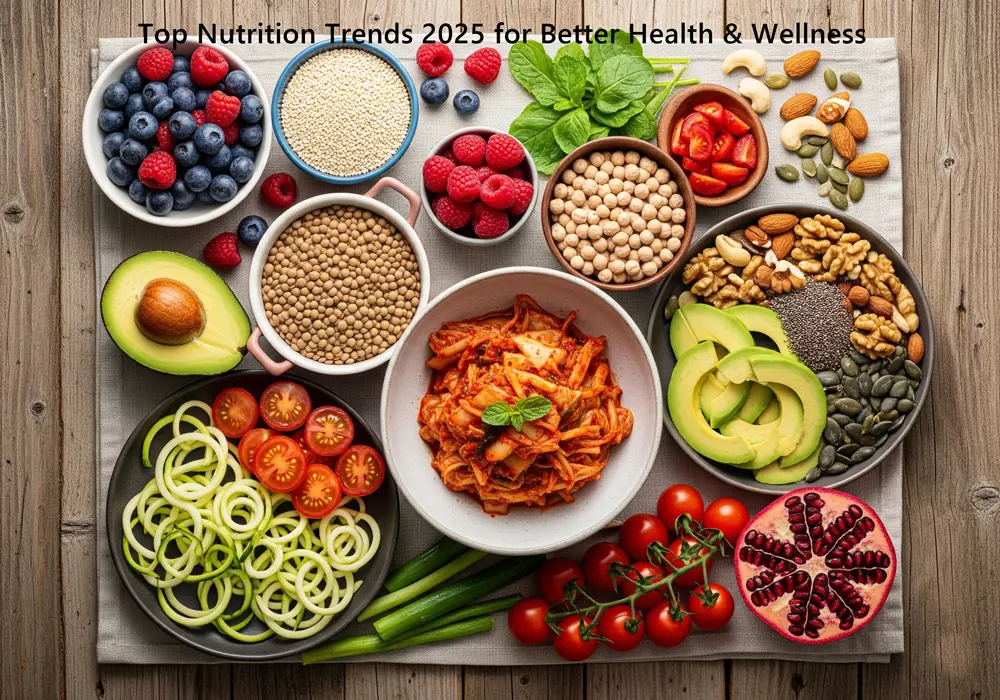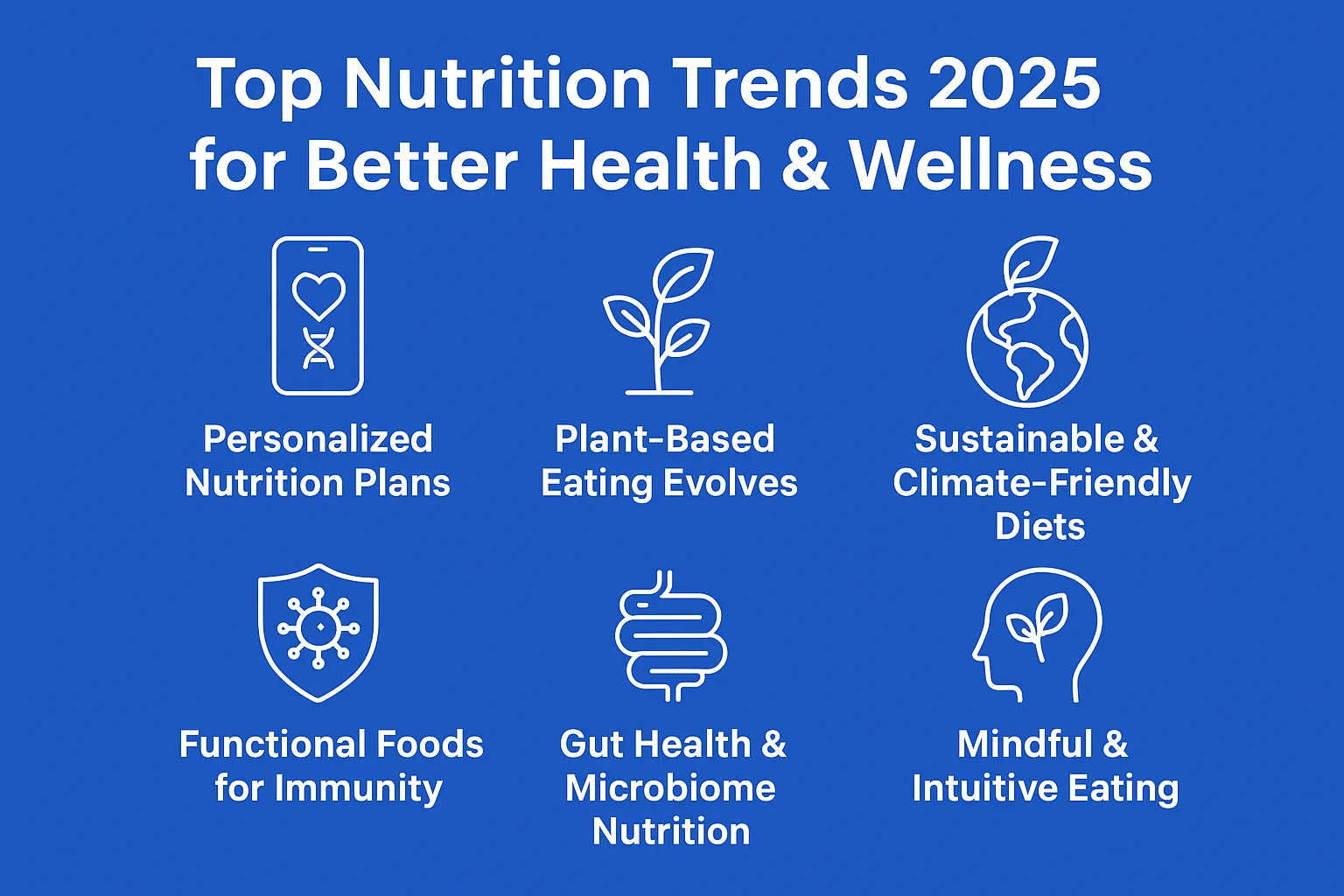Table of Contents
- Introduction
- 1. Personalized Nutrition Plans
- 2. Plant-Based Eating Evolves
- 3. Sustainable & Climate-Friendly Diets
- 4. Functional Foods for Immunity
- 5. Gut Health & Microbiome Nutrition
- 6. Mindful & Intuitive Eating
- 7. High-Protein Diets Get Smarter
- 8. Digital Health & Smart Nutrition Apps
- 9. Holistic Wellness Diets
- 10. Longevity Diets
- Conclusion: Eating for the Future
- FAQs: Nutrition Trends 2025
Introduction
As we step into 2025, nutrition is no longer just about food—it’s about science, health, and wellness combined. With new research, innovative food technology, and changing lifestyles, the way we eat is evolving at a rapid pace. From personalized nutrition to sustainable diets, these nutrition trends 2025 are shaping how we approach health and well-being.
This guide explores the top nutrition and diet trends for 2025, backed by science and aimed at helping you live a healthier, more balanced life. Whether you’re a health enthusiast, a wellness coach, or someone looking to improve eating habits, these trends provide valuable insights for the future of food.

1. Personalized Nutrition Plans
Advancements in biotechnology and AI are making personalized nutrition widely accessible. Instead of one-size-fits-all diets, 2025 will focus on DNA-based nutrition plans and microbiome testing.
- Why it matters: Everyone’s body responds differently to food. Personalized diets improve digestion, energy, and weight management.
- Example: Apps that track biomarkers and recommend meal plans tailored to your genetics and lifestyle.
2. Plant-Based Eating Evolves
Plant-based diets aren’t new, but in 2025, they’ll move beyond soy burgers and almond milk. Expect innovative plant proteins, lab-grown meat alternatives, and plant-based seafood.
- Health impact: Reduces cholesterol, supports heart health, and lowers cancer risk.
- Trend boost: Eco-conscious consumers are increasing demand for sustainable, plant-based wellness foods.
3. Sustainable & Climate-Friendly Diets
Food production contributes heavily to climate change. In 2025, eco-friendly diets will be a top priority. Sustainable nutrition includes low-carbon meals, and upcycled ingredients.
- Benefit: Eating sustainably supports both personal health and the planet.
- Popular choice: Flexitarian diets, which balance plant-based eating with occasional meat.
4. Functional Foods for Immunity
Health-conscious consumers are turning to functional foods—foods enhanced with added nutrients. In 2025, expect growth in probiotic drinks, vitamin-fortified snacks, and antioxidant-rich powders.
- Why now: Post-pandemic, immune health remains a priority.
- Examples: Turmeric lattes, mushroom coffee, and gut-healthy kombucha.
5. Gut Health & Microbiome Nutrition
Gut health continues to dominate wellness trends. The microbiome diet—focused on foods that support healthy gut bacteria—will gain popularity.
- Science says: A healthy gut improves immunity, weight management, and mental health.
- Food choices: Prebiotic fibers (bananas, oats), fermented foods (kimchi, yogurt).
6. Mindful & Intuitive Eating
In 2025, diets will shift away from restriction. Mindful eating encourages people to listen to their bodies, avoid emotional overeating, and focus on whole foods.
- Benefit: Promotes mental wellness and reduces stress-related eating.
- Trend driver: A rising focus on mental health alongside physical health.
7. High-Protein Diets Get Smarter
Protein remains a top priority, but the sources are changing. In 2025, expect to see clean-label protein powders, insect-based proteins, and hybrid protein products.
- Why it matters: Supports muscle growth, metabolism, and satiety.
- Health upgrade: Blended proteins (plant + animal) for balanced nutrition.
8. Digital Health & Smart Nutrition Apps
Technology is making healthy eating easier. In 2025, AI-driven apps, wearable devices, and food scanners will help track nutrients, calories, and hydration in real time.
- Benefit: Data-driven eating habits for weight loss and better health.
- Example: Apps suggesting recipes based on nutrient gaps in your daily diet.
9. Holistic Wellness Diets
Nutrition is no longer just physical—it’s mental and emotional too. Diets in 2025 will integrate stress-reducing foods, brain-boosting nutrients, and hormone-balancing diets.
- Focus areas: Omega-3-rich foods, adaptogens, and magnesium-packed meals.
- Outcome: Better energy, focus, and emotional resilience.
10. Longevity Diets
As life expectancy rises, people want not just longer lives but healthier ones. The longevity diet trend includes Mediterranean-style meals, calorie restriction, and anti-inflammatory foods.
- Science-backed: Studies from organizations like the show diets rich in olive oil, nuts, and fish improve heart and brain health.
- Goal: Prevent age-related diseases and support healthy aging.
Conclusion: Eating for the Future
The nutrition trends for 2025 highlight a move toward customized, eco-friendly, and scientifically supported diets.
These aren’t just fads—they’re long-term changes designed to improve health, wellness, and the environment.
👉 By embracing these emerging diet trends, individuals can achieve better physical health, mental balance, and long-lasting wellness.
FAQs: Nutrition Trends 2025
Q1. What is the biggest nutrition trend in 2025?
Personalized nutrition is the most important trend, as it tailors diets to individual needs.
Q2. Are plant-based diets still popular in 2025?
Yes, but they’re evolving with lab-grown proteins, plant-based seafood, and eco-friendly options.
Q3. How does gut health affect overall wellness?
A healthy gut microbiome boosts immunity, improves digestion, and supports mental health.
Q4. Will AI play a role in future nutrition?
Absolutely. AI-powered apps and wearables will track nutrients and recommend personalized diets.
Q5. What diet helps with longevity?
The Mediterranean diet and anti-inflammatory foods continue to be recognized for promoting healthy aging.



